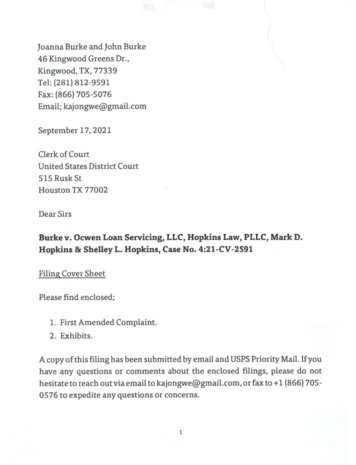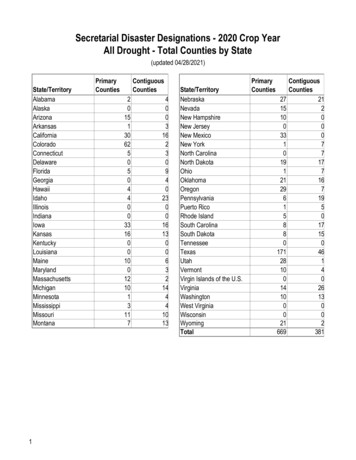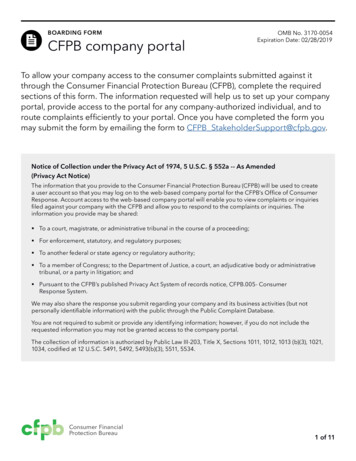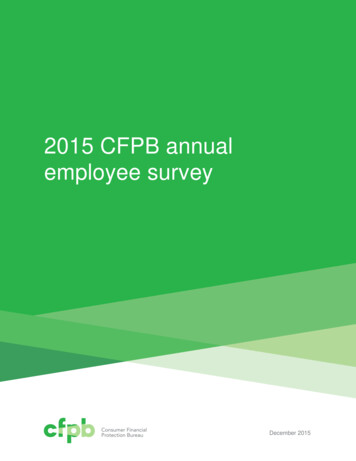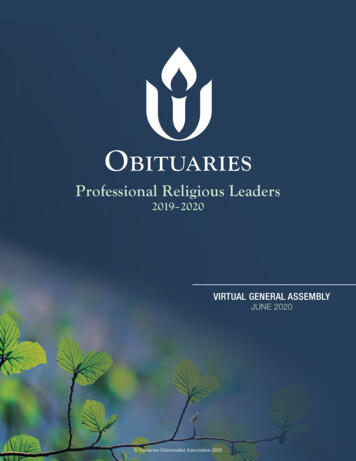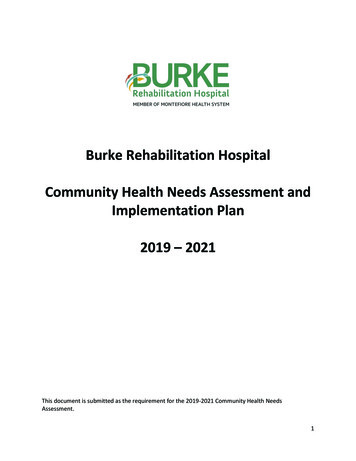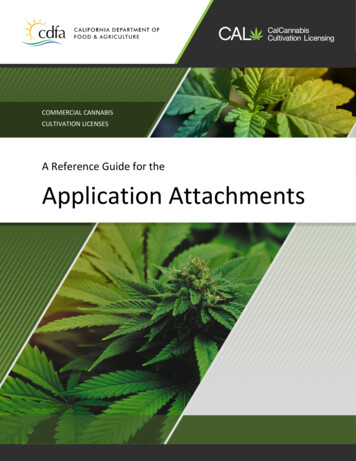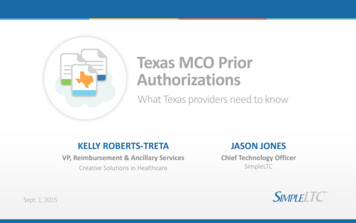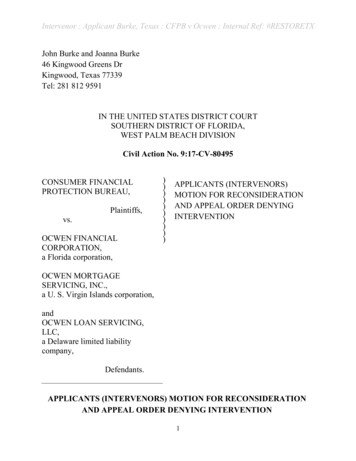
Transcription
Intervenor : Applicant Burke, Texas : CFPB v Ocwen : Internal Ref: #RESTORETXJohn Burke and Joanna Burke46 Kingwood Greens DrKingwood, Texas 77339Tel: 281 812 9591IN THE UNITED STATES DISTRICT COURTSOUTHERN DISTRICT OF FLORIDA,WEST PALM BEACH DIVISIONCivil Action No. 9:17-CV-80495CONSUMER FINANCIALPROTECTION BUREAU,vs.Plaintiffs,OCWEN FINANCIALCORPORATION,a Florida corporation,))))))))))APPLICANTS (INTERVENORS)MOTION FOR RECONSIDERATIONAND APPEAL ORDER DENYINGINTERVENTIONOCWEN MORTGAGESERVICING, INC.,a U. S. Virgin Islands corporation,andOCWEN LOAN SERVICING,LLC,a Delaware limited liabilitycompany,Defendants.APPLICANTS (INTERVENORS) MOTION FOR RECONSIDERATIONAND APPEAL ORDER DENYING INTERVENTION1
Intervenor : Applicant Burke, Texas : CFPB v Ocwen : Internal Ref: #RESTORETXTO THE HONORABLE JUDGE OF SAID COURT:Joanna Burke and John Burke, Senior Citizens (“Applicants”) herein submittheir Motion for Reconsideration and note the Court summarized the denial ofIntervention for the following specific reasons;(i)Intervention of Right: (a) Applicants failed to establish their interests,if any, would be impaired, and (b) that in any event CFPB wouldrepresent the Applicants interests, and (c) the Applicants “could haveor could” raise any concerns in their recent Texas foreclosure litigation.(ii)Permissive Intervention: (a) Intervenors fail to identify a commonquestion of fact or law in support of intervention and; (b) in any event,even taking into consideration an “overlap” between CFPB’s case andthat of Intervenors, an intervention at this time would prejudice theparties and unduly delay the proceedings.The Applicants contend that it was error for this Court to deny their petitionto intervene for the following reasons:Intervention of Right(a) Contrary to this Courts assessment, the Applicants have clearly establishedtheir interests and that their rights would be impaired.2
Intervenor : Applicant Burke, Texas : CFPB v Ocwen : Internal Ref: #RESTORETX(i) It was highlighted during the Applicants filings that the first andunderlying case by Deutsche Bank against the Burkes’ - a company which hasrecently reneged on a Court mandated settlement of 7.2 billion US Dollars, 4.1 billion of which was ‘set aside’ for homeowners1 - was not a party in thiscase.(ii) The Applicants also responded, confirming the Burke v Ocwen LoanServicing LLC (Case No. 4:18-cv-04544) civil action is a new case beinglitigated in the SDTX Court and now on appeal to the Court of Appeals forthe Fifth Circuit (USCA No. 19-20267). This does include a party to theseproceedings.The reason for allowing intervention of right in this case [included]; toensure if Ocwen’s motion to dismiss on the Constitutionality question wasgranted (which is pending before this Court), it could allow the Applicants tobecome the lead Plaintiffs’ in the case, and;The Applicants wish to obtain facts and access documents which wouldhelp their current and ongoing Appellate case in Texas and potentially submit1See dential-mortgage-backed andhttps://www.db.com/newsroom .htm and reneging on the ners-evaporated3
Intervenor : Applicant Burke, Texas : CFPB v Ocwen : Internal Ref: #RESTORETXmotion[s] prior to trial, seeking answers to questions which have not beenadequately addressed by CFPB, based on the ‘limited’ view of the record andfilings on ECF/Pacer, and;If the case proceeds to trial and/or settlement, to ensure the Applicantsand homeowners obtain financial relief which equates to their tangible andeconomic loss, not a paltry 1,500 check (National Mortgage Settlement’s topfinancial reward to foreclosed homeowners,).The Burke v Ocwen case has two possible outcomes;(1) The Burkes’ prevail against Ocwen, in which case the findings canonly help Plaintiffs’ and Intervenor(s) in this civil action obtain more relieffor homeowners in any judgment or settlement, or;(2) The Burkes’ do not prevail against Ocwen, in which case theBurkes’ can seek restitution in this case and may find new evidence to helpwith any potential motions and/or appeal(s).In either (1) or (2) Intervention will allow Applicants access to sealeddocuments and discovery in the case which will be helpful to the ongoing casein Texas against Ocwen. This is discussed further below in permissive4
Intervenor : Applicant Burke, Texas : CFPB v Ocwen : Internal Ref: #RESTORETXintervention, e.g. Horwitz In Re: Checking Account Overdraft Litigation(1:09-md-02036) District Court, S.D. Florida. 2(b) As previously documented, the CFPB have repelled the very homeownersthey claim to protect in brazen filings before this Court. It cannot now be claimedthey would adequately represent homeowners, including the Applicants, when theytreat homeowners as adversaries.The CFPB has failed homeowners continually since the 2008 Financial Crisis.At an average settlement value of 1,5003 (post foreclosure loss and eviction fromthe homestead, that is clearly a wanton failure to prosecute and abandonment of theirduties to consumers, homeowners and citizens.More egregiously, they have allowed Ocwen Financial, Ocwen LoanServicing LLC and all the other related shell companies and key directors to continueto trade. In fact, and more egregiously, CFPB has endorsed Ocwen to substantially2“Oral Argument held on Motion to Intervene and Motion to Unseal Class Certification Material(D.E. #2016) (Jeff Horwitz, Pro Se' Robert C. Josepberg, Esq. - Peter W. Homer, Esq.) TheCourt finds that the motion to Intervene be and the same is hereby Granted - Mr Horwitz shallfollow the Rules of Civil Procedure.” (Doc. 2199)3See “The national mortgage settlement only included 5 billion in actual hard dollars: 3.5 billionto the states, and another 1.5 billion in “sorry you illegally lost your home” checks for foreclosurevictims. The checks totaled 1,480 each ” ortage-crisis/ and Non-Bank mortgage servicer PHH Settlement (2018); Borrowers who weresubjected to PHH foreclosures during the eligible period will qualify for a minimum 840payment, and borrowers who faced foreclosures that PHH initiated during the eligible period, butdid not lose their home, will receive a minimum 285 payment. Approximately 1,600 New Yorkersare eligible for a payment. See age-corporation5
Intervenor : Applicant Burke, Texas : CFPB v Ocwen : Internal Ref: #RESTORETXincrease their major stake in the non-bank marketplace with many acquisitions in theintervening period between 2008-2019.All this, despite the well documented history of non-compliance and defianceto Court orders which Ocwen continues to this very day, including, for example,Erbey’s (Altisource et al) non-compliance by continuing his executive role andinterfering with Ocwens’ business, when he was ‘officially’ removed from the boardas part of past settlement agreements.The CFPB has failed to regulate. They have neglected homeownersthroughout the country, as admitted in the original complaint wherein they detail the580,000 plus ‘customers’ of Ocwen being abused yet they take no accountability fortheir own dilatory and weak attempts at enforcement in their decade of disfunctionsince the Great Recession. The question of the CFPB’s constitutionality still ragesthroughout the circuits to this day. 4 It is clear, based on these undeniable facts, theApplicants should be granted intervention of right.(c) The Texas case against the named Party here (Ocwen), is on Appeal andwould benefit from the information gained via this Plaintiff-Intervenor Application,4On June 7, 2019, Seila Law LLC asked the U.S. Court of Appeals for the Ninth Circuit to stay acivil investigative demand the CFPB wants to enforce after the appellate panel ruled the bureau’ssingle-director leadership structure is constitutional. Seila Law asked for the stay because it “plansto file a petition for certiorari presenting the exceptionally important question whether theCFPB’s structure violates the constitutional separation of powers” according to the firm’smotion. Kannon Shanmugam of Paul Weiss Rifkind Wharton & Garrison LLP has been retainedby Seila Law LLC’s to present its case at the Supreme Court.6
Intervenor : Applicant Burke, Texas : CFPB v Ocwen : Internal Ref: #RESTORETXif approved on reconsideration. To answer the Courts concerns, the Applicants viewthis Intervention, in lay-person terms, as equivalent to that of a crossclaim/counterclaim, wherein the Applicants are seeking to be Plaintiff-Intervenors,over the objections of the CFPB (cross-claim), and a counterclaim against Ocwen.In plain words, it’s a “meat and potatoes” type of request and one which is typicallyallowed by Courts across the State and the Circuit[s] in order that justice may beserved. It is a very reasonable request in order that the Burkes’ “can” raise anyconcerns in their Texas foreclosure litigation.Permissive InterventionRULE 24(B) PERMISSIVE INTERVENTION CASE LAW WITH EXTRACTCITATIONS“We think the District Court should have granted the alternative motion seekingpermissive intervention under Rule 24(b). While reversal of the denial ofpermissive intervention is not often warranted, there is undoubted jurisdiction toenter such an order where the District Court has not followed the appropriatestandard or approach in exercising its discretion. See Textile Workers Union v.Allendale Co., supra, 96 U.S. App. D.C. at 405- 06, 226 F.2d at 769-70.”“Rule 24(b), not amended in 1966, provides basically that anyone may be permittedto intervene if his claim and the main action have a common question of law orfact. In the present case the legal issues are the same.”– citing William E. Nuesse,Commissioner of Banks, State of Wisconsin v. William Camp, Comptroller of theCurrency, 385 F.2d 694 (D.C. Cir. 1967)7
Intervenor : Applicant Burke, Texas : CFPB v Ocwen : Internal Ref: #RESTORETX“Rule 24(b) requires, as a threshold consideration, a common question of law orfact with the main dispute. The determination is not discretionary; it is aquestion of law. Stallworth v. Monsanto Co., 558 F.2d 257, 269 (5th Cir. 1977).”– citing New Orleans Public Service, Inc., Ernest Morial, Movants-Appellants v.United Gas Pipe Line Company, 690 F.2d 1203 (5th Cir. 1982)(a) The Applicants question how they fail this burden of proof. "Questions of factare questions about what actually took place between the parties." There shouldbe no dispute that the Burkes’ have ongoing dealings with Ocwen and thereshould be no dispute that the Burkes’ wrote to the CFPB prior to this Applicationfor Intervention, as documented in filings before this Court. The facts have beendiscussed in great depth. This part of the Courts’ Order is empirically notsupported by the record and the Applicants seek reconsideration of thisstatement.(b) The timeliness and prejudice objection is also without merit. The Burkes’submitted their application on Dec 27, 2018 to this Court. The Applicants thenhad to send a reminder to this Court on May 10, 2019 (Doc. 359). It has requiredsix months for this Court to reply to the original Application. The Burkes’understand the Court and docket is busy, however, it is certainly not the Burkes’who have been tardy in filing, and who explained at length the reasons for filingon December 27, 2018, only a month or so after the entry of judgment offoreclosure in their own Texas case.8
Intervenor : Applicant Burke, Texas : CFPB v Ocwen : Internal Ref: #RESTORETXFirst, consider United States of America v. Halifax Hospital Medical Center(6:09-cv-01002) District Court, M.D. Florida which commenced in 2009 andif you look at Doc. 3 (June 2010), the United States decides not to interveneand then again at Doc. 64, the United States has by now decided it does wishto intervene (opposed), some 2 years since the case started, and afterScheduling and discovery has been ongoing. Nevertheless, the interventionis granted by the Court.Secondly, in Florida Pediatric v. Secretary - AHCA (1:05-cv-23037-AJ)District Court, S.D. Florida, Doc. discusses “timeliness” in great detail. “ThisCircuit has recognized that “‘timeliness is not a word of exactitude or ofprecisely measurable dimensions.The requirement of timeliness must have accommodating flexibility towardboth the court and the litigants if it is to be successfully employed to regulateintervention in the interest of justice.’” Chiles v. Thornburgh, 865 F.2d 1197,1213 (11th Cir. 1989) (quoting McDonald v. E.J. Lavino Co., 430 F.2d 1065,1074 (5th Cir. 1970). A review of this order further analyzes “timeliness”factors;“In deciding whether a motion to intervene is timely, the court must considerthe following factors: (1) the length of time during which the proposedintervenor knew or reasonably should have known of his interest in the case9
Intervenor : Applicant Burke, Texas : CFPB v Ocwen : Internal Ref: #RESTORETXbefore moving to intervene, (2) the extent of prejudice to the existing partiesas a result of the proposed intervenor’s failure to move for intervention assoon as he knew or reasonably should have known of his interest 5, (3) theextent of prejudice to the proposed intervenor if the motion to intervene isdenied, and (4) the existence of unusual circumstances militating either for oragainst a determination that the motion to intervene was timely. Id. at 264-66;Ga. v. U. S. Army Corps of Engineers, 302 F.3d 1242, 1259 (11th Cir. 2002).”Here, the Applicants easily pass all four tests as; (1) the time was very shortthat the Intervenor-Applicants knew of their interest in the case; (2) As alreadynoted, the Applicants have not unreasonably delayed in bringing their Motion;(3) Also as noted in the Intervention of Right answer above, the Applicantshave discussed how they would be prejudiced if this Court does not allowintervention, based on the Applicants current Texas civil action againstOcwen.Furthermore, the Applicants view this in lay-person terms as equivalent tothat of a cross-claim/counterclaim, wherein the Applicants are seeking to bePlaintiff-Intervenors over the objections of the CFPB (cross-claim) and a5The Order continues; “Likewise, the second factor also weighs in favor of the InterveningPlaintiffs. “[T]he relevant issue is not how much prejudice would result from allowingintervention, but rather how much prejudice would result from the would-be intervenor’s failureto request intervention as soon as he knew or should have known of his interest in the case.”Stallworth, 558 F.2d at 267.”10
Intervenor : Applicant Burke, Texas : CFPB v Ocwen : Internal Ref: #RESTORETXcounterclaim against Ocwen ; (4) The same answer applies here, as per thecited case.6In relation to ‘undue delay’ the Applicants have shown that this Courts sixmonth delay in responding to the Application is outwith the control of theApplicants and they submitted a timely Application to the Court forconsideration. To punish the Burkes’ for this Courts’ own administrativedelay would be a denial of due process.Furthermore, the Applicants interests are not to delay litigation, but to seekthe right solution in favor of justice. The Intervenors have not had theopportunity to review the entire record due, in part, to the sealed and protecteddocuments.However, it is not foreseen that any potential Intervenors requests andmotions would materially delay the case more so than it has already endured,by the many requests by the Parties in this action, which has frustrated eventhis Court and was documented in a paperless minute entry, Doc. 381. 76“Finally, neither party has demonstrated any unusual circumstances that militate either for oragainst a determination that the Motion was timely filed.”7“Second, the Court has had to divert a substantial amount of its judicial resources from othercases in an effort to resolve the repeated, and often unnecessary, discovery disputes which haveconstantly arisen in this case The Court expects better of counsel. The parties' counsel haveprofessional and ethical duties to attempt to resolve, and not exacerbate, discovery disputes in thismatter.”11
Intervenor : Applicant Burke, Texas : CFPB v Ocwen : Internal Ref: #RESTORETX(c) The Applicants also wish to add that if Intervention of Right and PermissiveIntervention based on (a) and (b) above is denied in totality, in the Burkes’reminder letter to this Court, they requested Intervention for the reduced purposeof access to sealed files and protected documents8 which will aid them with thecurrent case, on appeal at the Court of Appeals for the Fifth Circuit, (see Doc.359) citing the Larry Flynt intervention to unseal documents, which was grantedon appeal to the US Court of Appeals for the 8th Cir., Case No. 14-1187 (2015).In the alternative, quoting from Florida case law, the Applicants refer to; InRe: Checking Account Overdraft Litigation (1:09-md-02036) District Court,S.D. Florida. In that case, a reporter by the name of Horwitz, submitted anApplication to Intervene, (Doc. 2016 and 2119) and the InterventionApplication was subsequently granted in December 2011, 2 years after thecomplaint was filed. (Doc. 2212).Docs. 2016 and 2119 contains many reasons why the Burkes’ should begranted Intervention to access documents, cites the First Amendment as it is apublic right and a case which affected millions of bank customers. Horwitz8“The courts have widely recognized that the correct procedure for a nonparty to challenge aprotective order is through intervention for that purpose. Public Citizen v. Liggett Group, Inc., 858F.2d 775, 783 (1st Cir.1988), cert. denied, --- U.S. ----, 109 S.Ct. 838, 102 L.Ed.2d 970 (1989).When a collateral litigant seeks permissive intervention solely to gain access to discovery subjectto a protective order, no particularly strong nexus of fact or law need exist between the two suits.Meyer Goldberg, Inc. v. Fisher Foods, Inc., 823 F.2d 159, 164 (6th Cir.1987). - See United NuclearCorp., 905 F.2d at 1427; Meyer Goldberg, Inc., 823 F.2d at 162.12
Intervenor : Applicant Burke, Texas : CFPB v Ocwen : Internal Ref: #RESTORETXcited many relevant cases e.g. Pansy v. Borough of Stroudsburg, 23F.3d,discussing the ‘question of law or fact’ when a non-party.He comments on his work writing as a freelance journalist for AmericanBanker in this case and intervention on his website9.In summary, if a non-party, who is a news reporter, and who did not have anydirect grievance or complaint against the parties can obtain permissiveintervention, then there is no just reason why the Burkes’ - who do have a directinterest - should not have the same access to records in this case.This request was not answered in this Courts’ response and denial of theApplication by the Burkes’. The Applicants respectfully request this isconsidered and decided upon, as necessary, in this Reconsideration Motion.CONCLUSION & PRAYERThe Applicants respectfully requests that this Court grant the Applicantsmotion to intervene as of right pursuant to Rule 24(a) or alternatively withpermission pursuant to Rule 24(b) or finally with the restricted access to all Court9“Overdraft Fee Litigation — Union Bank Email Shows Overdraft’s Underbelly — The massivechecking overdraft litigation case in Florida is plodding along, though Union Bank settled shortlyafter class certification. Over the opposition of lawyers for Wells Fargo and JPMorgan Chase, Iintervened pro se as a party to the case, allowing me to petition the court to unseal documentsand exhibits. DIY legal work!” See / SeeExhibit A, Doc. 2119 for American Banker Article.13
Intervenor : Applicant Burke, Texas : CFPB v Ocwen : Internal Ref: #RESTORETXdocuments in this case, keeping the precedent of the S.D. Court intact (see Horwitz),as well as the Constitutional First Amendment rights and public access to Courtrecords which are not available on PACER/ECF, e.g. providing the same reliefwhich was granted to journalist Horwitz in a similar motion, in a comparable, highprofile, financial institutional fraud against consumers related civil action.RESPECTFULLY submitted this 11th day of June, 2019.I declare under penalty of perjury that the foregoing is true and correct and thecertificates that follow are also correct. (28 U.S.C. § 1746 - U.S. Code.)10Joanna Burke / Harris CountyState of Texas, Pro SeI declare under penalty of perjury that the foregoing is true and correct and thecertificates that follow are also correct. (28 U.S.C. § 1746 - U.S. Code.)John Burke / Harris CountyState of Texas, Pro Se10See Bubble Gum Productions, LLC v. Does 1-80 (1:12-cv-20367), District Court, S.D. Florida,Doc. 48, Footnote 1, “Further, any attempt to call into question the use of the declaration ismeritless. 28 U.S.C. § 1746; Thomas v. U.S. Dept. of Energy, 719 F.2d 342, 344 n.3 (10th Cir.1983) (“28 U.S.C. § 1746 (1976) specifically authorizes the use in federal proceedings of unsworndeclarations given under penalty of perjury in lieu of affidavits.”).”14
Intervenor : Applicant Burke, Texas : CFPB v Ocwen : Internal Ref: #RESTORETX46 Kingwood Greens DrKingwood, Texas 77339Phone Number: (281) 812-9591Fax: (866) 705-0576Email: kajongwe@gmail.comCERTIFICATE OF COMPLIANCEThis motion for reconsideration is produced using 14-point Times Roman type and12-point Times Roman type in the footnotes and contains approximately 2,935words, which is less than the total words permitted by the rules of the Court. Pro seIntervenor-Applicants rely upon the word count of the computer program used toprepare this brief.CERTIFICATE OF NON-CONFERENCENo conference or discussion was made or attempted with Plaintiffs or Defendantsfor the following reason(s); as the Applicants have previously advised the Court themalfeasance of the CFPB attorneys who did not contact or make attempts to conferwith the Intervenor-Applicants in their past motion[s] wherein they sided withopposing counsel and then objected (as lead author) to homeowners Application toIntervene, consumers who they claim to represent. Applicants therefore assume allparties will object to the motion for reconsideration.15
Intervenor : Applicant Burke, Texas : CFPB v Ocwen : Internal Ref: #RESTORETXCERTIFICATE OF SERVICEWe, Joanna Burke and John Burke hereby certify that on June 11, 2019, we postedthe attached document via USPS Priority Mail to the US District Court;Clerk of CourtUnited States District CourtSouthern District of FloridaWest Palm Beach DivisionPaul G. Rogers Federal Building and U.S. Courthouse701 Clematis Street, Room 202West Palm Beach, FL 33401And also served copies to the following parties, by USPS Priority Mail:CFPB (Plaintiffs)Anthony Alexis,Enforcement DirectorCara Petersen,Deputy Enforcement Director for LitigationGabriel O’Malley,Assistant Litigation DeputyJean HealeySenior Litigation CounselEmail: jean.healey@cfpb.govEmail: Jean.healeydippold@cfpb.govJan SingelmannE-mail: jan.singelmann@cfpb.govAtur DesaiE-mail: atur.desai@cfpb.govTianna Elise BaezEmail: tianna.baez@cfpb.govStephanie C. BrenowitzEmail: stephanie.brenowitz@cfpb.gov16
Intervenor : Applicant Burke, Texas : CFPB v Ocwen : Internal Ref: #RESTORETXLawrence DeMille-WagmanEmail: lawrence.wagman@cfpb.govErin Mary KellyEmail: erin.kelly@cfpb.govGregory Ryan NodlerEmail: Greg.Nodler@CFPB.govMichael PosnerEmail: michael.posner@cfpb.govJack Douglas WilsonEmail: doug.wilson@cfpb.govJames Joseph Savagejames.savage@cfpb.govAmanda Christine Robersonamanda.roberson@cfpb.govMailing Address:Consumer Financial Protection Bureau1700 G Street NWWashington, DC 20552Attorneys for PlaintiffConsumer Financial Protection BureauOffice of Attorney General &Office of Financial Regulation (Plaintiffs)Jennifer Hayes PinderSasha Funk GranaiMailing Address:Office of Atty. Gen., State of Fla.,Dept. of Legal Affairs3507 East Frontage RoadSuite 325Tampa, FL 33607OCWEN (Defendants)17
Intervenor : Applicant Burke, Texas : CFPB v Ocwen : Internal Ref: #RESTORETXBridget Ann BerryBerryB@gtlaw.comAndrew Stuart Weinweina@gtlaw.comMailing Address:Greenberg TraurigPhillips Point - East Tower777 S Flagler DriveSuite 300EWest Palm Beach, FL 33401Thomas M. Hefferon (pro hac vice)thefferon@goodwinlaw.comSabrina M. Rose-Smith (pro hac vice)srosesmith@goodwinlaw.comCatalina AzueroCAzuero@goodwinlaw.comMichelle Treadwell BriggsMBriggs@goodwinlaw.comMolly MaddenMMadden@goodwinlaw.comMailing Address:GOODWIN PROCTER LLP901 New York Ave., NWWashington, DC 20001Matthew Previnmprevin@buckleysandler.comMailing Address:BUCKLEYSANDLER, LLP1133 Ave. of the Americas, Suite 3100New York, NY 10036Attorneys for Defendants Ocwen Financial Corp.,Ocwen Mortgage Servicing, Inc., and Ocwen Loan Servicing, LLC18
(1) The Burkes' prevail against Ocwen, in which case the findings can only help Plaintiffs' and Intervenor(s) in this civil actionobtain more relief for homeowners in any judgment or settlement, or; (2) The Burkes' do not prevail against Ocwen, in which case the Burkes' can seek restitution in this case and may find . new . evidence to help
